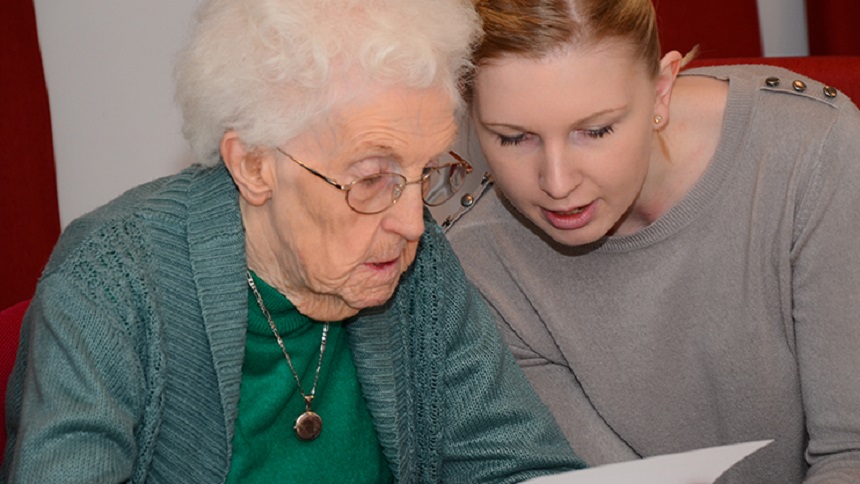Keep talking
We share some ideas to help a person with dementia to continue expressing themselves.

Communication is about more than getting a piece of information across to another person. Being able to express ourselves and share things with each other is important to our sense of identity and how connected we feel.
It may become more challenging as dementia progresses, but ensuring there are opportunities for conversation, wherever possible, can make a big difference.
Photographs or a life story book could provide things to talk about, as could a This is me tool with the person’s background and preferences filled in.
Collections of interesting objects can be good prompts – for example, if someone likes plants and flowers, lay out a selection to see if they can identify them or say which their favourites are. Or they might enjoy looking through a newspaper or magazine together.
If a person finds it difficult to communicate their needs fully, they may still notice facial expressions, tone of voice and body language, so speak as you normally would. Some people find speech physically difficult, others struggle to find the right word, and others have different problems. Give them the time they need to understand what’s been said and to express themselves.


Mo
saysWe're really sorry to hear this, Mo. This must be a really difficult situation.
We have lots of information about communication on our website (https://www.alzheimers.org.uk/about-dementia/symptoms-and-diagnosis/symptoms/communicating-and-dementia) or from the factsheet (https://www.alzheimers.org.uk/sites/default/files/2020-03/communicating_500.pdf).
The section on non-verbal communication may be of particular interest (https://www.alzheimers.org.uk/about-dementia/symptoms-and-diagnosis/symptoms/non-verbal-communication-and-dementia). You can also listen to this information through Soundcloud: https://soundcloud.com/alzheimers-society-uk/helpsheet-dementia-carer-communication
For more personalised advice that's specific to your situation, we'd recommend contacting our support line on 0333 150 3456 to speak with one of our trained dementia advisers. You can find more details about the support line (including opening hours and other methods of contact) here: https://www.alzheimers.org.uk/dementia-connect-support-line
You might also want to join our online community, Talking Point. Here, people with dementia and others share their experiences and offer advice to people going through similar situations. You can browse the conversations within the community or sign up for free: https://forum.alzheimers.org.uk/
We hope this helps for now, Mo. Please do call our support line if you need more advice or tailored suggestions.
Alzheimer's Society website team
ashercat
saysI cannot find a place to talk online about my dad.
Hi there, thanks for getting in touch.
If you're looking for a place to talk about your dad with other people who may be in similar situations, then our online community Dementia Talking Point is worth looking at:
https://forum.alzheimers.org.uk/
If you'd like to talk to one of our expert Dementia Advisers about your situation and how we might be able to support you, then we'd recommend calling our helpline. They can provide tailored advice, information and emotional support for whatever you're going through:
https://www.alzheimers.org.uk/get-support/national-dementia-helpline
I hope this is helpful - please do contact us again or call the helpline if you have any more questions.
Thanks,
--
Alzheimer's Society blog team